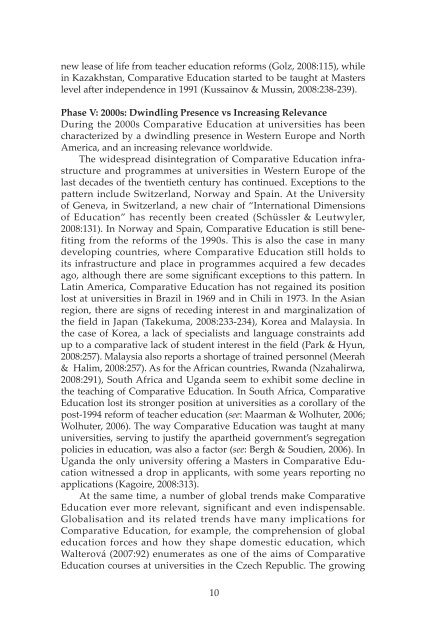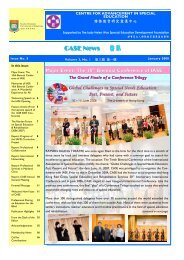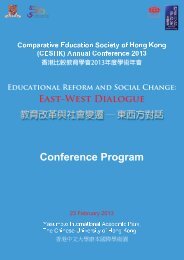Comparative Education Bulletin - Faculty of Education - The ...
Comparative Education Bulletin - Faculty of Education - The ...
Comparative Education Bulletin - Faculty of Education - The ...
Create successful ePaper yourself
Turn your PDF publications into a flip-book with our unique Google optimized e-Paper software.
new lease <strong>of</strong> life from teacher education reforms (Golz, 2008:115), while<br />
in Kazakhstan, <strong>Comparative</strong> <strong>Education</strong> started to be taught at Masters<br />
level after independence in 1991 (Kussainov & Mussin, 2008:238-239).<br />
Phase V: 2000s: Dwindling Presence vs Increasing Relevance<br />
During the 2000s <strong>Comparative</strong> <strong>Education</strong> at universities has been<br />
characterized by a dwindling presence in Western Europe and North<br />
America, and an increasing relevance worldwide.<br />
<strong>The</strong> widespread disintegration <strong>of</strong> <strong>Comparative</strong> <strong>Education</strong> infrastructure<br />
and programmes at universities in Western Europe <strong>of</strong> the<br />
last decades <strong>of</strong> the twentieth century has continued. Exceptions to the<br />
pattern include Switzerland, Norway and Spain. At the University<br />
<strong>of</strong> Geneva, in Switzerland, a new chair <strong>of</strong> “International Dimensions<br />
<strong>of</strong> <strong>Education</strong>” has recently been created (Schüssler & Leutwyler,<br />
2008:131). In Norway and Spain, <strong>Comparative</strong> <strong>Education</strong> is still benefiting<br />
from the reforms <strong>of</strong> the 1990s. This is also the case in many<br />
developing countries, where <strong>Comparative</strong> <strong>Education</strong> still holds to<br />
its infrastructure and place in programmes acquired a few decades<br />
ago, although there are some significant exceptions to this pattern. In<br />
Latin America, <strong>Comparative</strong> <strong>Education</strong> has not regained its position<br />
lost at universities in Brazil in 1969 and in Chili in 1973. In the Asian<br />
region, there are signs <strong>of</strong> receding interest in and marginalization <strong>of</strong><br />
the field in Japan (Takekuma, 2008:233-234), Korea and Malaysia. In<br />
the case <strong>of</strong> Korea, a lack <strong>of</strong> specialists and language constraints add<br />
up to a comparative lack <strong>of</strong> student interest in the field (Park & Hyun,<br />
2008:257). Malaysia also reports a shortage <strong>of</strong> trained personnel (Meerah<br />
& Halim, 2008:257). As for the African countries, Rwanda (Nzahalirwa,<br />
2008:291), South Africa and Uganda seem to exhibit some decline in<br />
the teaching <strong>of</strong> <strong>Comparative</strong> <strong>Education</strong>. In South Africa, <strong>Comparative</strong><br />
<strong>Education</strong> lost its stronger position at universities as a corollary <strong>of</strong> the<br />
post-1994 reform <strong>of</strong> teacher education (see: Maarman & Wolhuter, 2006;<br />
Wolhuter, 2006). <strong>The</strong> way <strong>Comparative</strong> <strong>Education</strong> was taught at many<br />
universities, serving to justify the apartheid government’s segregation<br />
policies in education, was also a factor (see: Bergh & Soudien, 2006). In<br />
Uganda the only university <strong>of</strong>fering a Masters in <strong>Comparative</strong> <strong>Education</strong><br />
witnessed a drop in applicants, with some years reporting no<br />
applications (Kagoire, 2008:313).<br />
At the same time, a number <strong>of</strong> global trends make <strong>Comparative</strong><br />
<strong>Education</strong> ever more relevant, significant and even indispensable.<br />
Globalisation and its related trends have many implications for<br />
<strong>Comparative</strong> <strong>Education</strong>, for example, the comprehension <strong>of</strong> global<br />
education forces and how they shape domestic education, which<br />
Walterová (2007:92) enumerates as one <strong>of</strong> the aims <strong>of</strong> <strong>Comparative</strong><br />
<strong>Education</strong> courses at universities in the Czech Republic. <strong>The</strong> growing<br />
10
















